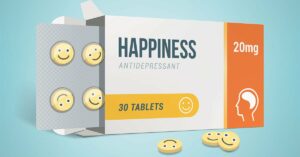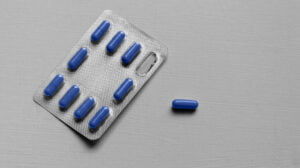Contents
- 1 Anxiety Medication For Teens
- 2 Types of Anxiety Medication for Teens
- 3 Anxiety Medication for Teens: Antidepressants
- 4 What are Antidepressants?
- 5 Selective Serotonin Reuptake Inhibitors (SSRIs)
- 6 Tricyclic Antidepressants
- 7 Monoamine Oxidase Inhibitors (MAOIs)
- 8 Benzodiazepine
- 9 Serotonin-norepinephrine Reuptake Inhibitors (SNRIs)
- 10 Buspirone
- 11 Side Effects of Antidepressant Medication For Teens?
- 12 A Word From MantraCare
Anxiety Medication For Teens
 There are many different kinds of anxiety medication for teens available in the market that helps relieve the symptoms of anxiety. If you’re a teen, it can be hard to find out if medication is right for you. This article has information about types of drugs, what they do and why they work, as well as possible side effects and when to see your doctor.
There are many different kinds of anxiety medication for teens available in the market that helps relieve the symptoms of anxiety. If you’re a teen, it can be hard to find out if medication is right for you. This article has information about types of drugs, what they do and why they work, as well as possible side effects and when to see your doctor.
The U.S. Food and Drug Administration (FDA) has approved two medications for anxiety in teens: alprazolam (Xanax) and escitalopram (Lexapro). Both are antidepressants that work to relieve symptoms of moderate-to-severe anxiety or generalized anxiety disorder. The FDA has also approved some antidepressants for teens with obsessive-compulsive disorder (OCD).
There are some types of antidepressants, such as selective serotonin reuptake inhibitors (SSRIs), which affect a chemical in the brain called serotonin. This is one theory about how they help relieve anxiety and depression. Teens who don’t respond to SSRIs may respond to other types of antidepressants, such as serotonin-norepinephrine reuptake inhibitors (SNRIs).
Types of Anxiety Medication for Teens
There are various types of anxiety medication for teens that fall into these categories: antidepressants, beta-blockers, benzodiazepines, and antipsychotics. Antidepressants like selective serotonin reuptake inhibitors ( SSRIs ) target specific chemicals in the brain, such as serotonin. Antidepressants may relieve anxiety symptoms in adolescents who don’t respond to other types of medications.
Anxiety Medication for Teens: Antidepressants

Antidepressant medications help reduce feelings of anxiety and depression by targeting specific chemicals in the brain. Some antidepressants may help with symptoms of anxiety if teens don’t respond to other medications, such as selective serotonin reuptake inhibitors (SSRIs).
Antidepressants can be helpful for some adolescents who have anxiety symptoms that may be linked to other mental health conditions, such as depression or panic disorder.
Antidepressants are believed to work by improving the way nerve cells communicate with each other through chemical messengers called neurotransmitters. This may help reduce symptoms of anxiety.
What are Antidepressants?
Antidepressants are prescription medications that have been developed to help individuals who suffer from depression and anxiety. They do this by affecting the chemicals in the brain, such as serotonin and norepinephrine.
Antidepressants For Anxiety- Antidepressants can be helpful for teens with any type of anxiety disorder, including social phobia, panic disorder, obsessive-compulsive disorder (OCD), and generalized anxiety disorder.
Selective Serotonin Reuptake Inhibitors (SSRIs)

Selective serotonin reuptake inhibitors (SSRIs) are a type of antidepressant that helps some teens with severe anxiety symptoms. Some common SSRIs are fluoxetine (Prozac), citalopram (Celexa), fluvoxamine (Luvox), paroxetine (Paxil), and sertraline (Zoloft).
What are Selective Serotonin Reuptake Inhibitors?
Selective serotonin reuptake inhibitors ( SSRIs ) are the most commonly prescribed antidepressant for teens with mild to moderate anxiety. They have fewer side effects than other antidepressants, which makes them a good option for adolescents who may be reluctant to try taking medication.
How (SSRIs) Work for Teens with Anxiety?
SSRIs help ease symptoms of anxiety by increasing serotonin levels in the brain, which can help balance mood and reduce feelings of worry and tension. It may also improve the ability to solve problems and resist impulsive behaviors.
There are a number of SSRIs that a doctor prescribes to treat anxiety. Examples include fluoxetine (Prozac), citalopram (Celexa), fluvoxamine (Luvox), paroxetine (Paxil), and sertraline (Zoloft).
Side Effects Of SSRIs In Teens
The most common side effects of SSRIs are nausea, stomachaches, headaches, dizziness, and sexual side effects. Other possible side effects include agitation or restlessness, sleep problems, drowsiness or fatigue, dry mouth or a metallic taste in the mouth, and sweating.
Tricyclic Antidepressants

Tricyclic antidepressants are a type of antidepressant that can help ease symptoms of panic disorder or obsessive-compulsive disorder (OCD) in adolescents. They may also be an option for teens with a generalized anxiety disorder because they don’t seem to increase the risk of suicidal thoughts.
Tricyclic antidepressants have been used for years to treat a number of mental health conditions, including anxiety and depression. They’re a good option if SSRIs or selective serotonin reuptake inhibitors don’t work. Tricyclic antidepressants work by stabilizing the levels of serotonin and norepinephrine in the brain. This can help balance mood and reduce feelings of worry or tension. It may also improve the ability to solve problems and resist impulsive behaviors.
Tricyclic Antidepressants For Anxiety
Common side effects of tricyclic antidepressants include dry mouth, constipation, and increased heart rate. Serious but uncommon side effects include seizures, irregular heartbeat (arrhythmias), and fainting.
Monoamine Oxidase Inhibitors (MAOIs)

MAOIs are a type of antidepressant that doctors prescribe when other antidepressants do not work. Doctors usually recommend taking an MAOI along with another type of antidepressant, especially if the patient also has depression.
Monoamine oxidase inhibitors are a type of antidepressant that may be helpful in treating people with generalized anxiety disorder, panic disorder, or obsessive-compulsive disorder (OCD). They may be teens who have depression or anxiety and other types of mental health conditions.
Monoamine oxidase inhibitors work by increasing the levels of certain neurotransmitters in the brain, including serotonin and dopamine. This can help balance mood and reduce feelings of worry or tension. It may also improve the ability to solve problems and resist impulsive behaviors.
MAOIs for Anxiety
Monoamine oxidase inhibitors include phenelzine (Nardil), tranylcypromine (Parnate), and isocarboxazid (Marplan). Side effects of MAOIs may include insomnia, nausea, weight loss, fatigue, dry mouth, sexual side effects, liver damage or failure, seizures, irregular heartbeat (arrhythmias), and fainting.
Antidepressants may help ease symptoms of anxiety if your teen isn’t taking any to treat other conditions. It’s important to remember that antidepressants are meant to be taken over a long period of time. Stopping medications suddenly can cause withdrawal-like symptoms, including anxiety.
Benzodiazepine

Benzodiazepines are a class of drugs that work by enhancing the effect of gamma-aminobutyric acid (GABA), an inhibitory neurotransmitter, which results in sedative effects. They’re usually prescribed for their anti-anxiety or sleep-inducing properties.
Benzodiazepines are used to treat anxiety disorders; they may also be prescribed for insomnia. Doctors sometimes use benzodiazepines in combination with antidepressants for treating OCD or social phobia because the two drugs work together well. Benzodiazepines can reduce obsessive thoughts and the need to perform compulsive behaviors, but they can also cause the following side effects:
How is Benzodiazepine Used for Anxiety Disorders?
Benzodiazepines commonly used to treat anxiety disorders include alprazolam (Xanax), clonazepam (Klonopin), and lorazepam (Ativan). Although benzodiazepines are usually effective in the short term, they are not intended for long-term use.
The FDA has approved only three benzodiazepines for the treatment of anxiety disorders: alprazolam (Xanax), clonazepam (Klonopin), and lorazepam (Ativan). Doctors may prescribe other benzodiazepines ” off-label”. Benzodiazepines generally work within 20 minutes to an hour when taken orally, and the effects last from six to eight hours. The extended-release form of clonazepam (Klonopin) can last up to 12 hours.
Side Effects of Benzodiazepine
Some common side effects of benzodiazepines include drowsiness, dizziness, and lightheadedness. Long-term use or higher doses may cause memory problems or anterograde amnesia (the inability to create new memories). Benzodiazepines may also be habit-forming, which means that when taken daily for a long period of time, the body becomes used to the effects and needs more of the drug in order to get the same level of anxiety relief.
Serotonin-norepinephrine Reuptake Inhibitors (SNRIs)
Serotonin-norepinephrine reuptake inhibitors are a type of drug that helps in treating depression, anxiety, or both. They may also be prescribed for other mental health conditions. Some examples of SNRIs are duloxetine (Cymbalta), venlafaxine (Effexor XR), and desvenlafaxine (Pristiq). Other medications that have an effect on serotonin and norepinephrine levels in the brain are included in this category as well. These other medications include selective serotonin reuptake inhibitors, monoamine oxidase inhibitors, tricyclic antidepressants, tetracyclic antidepressants, lithium, alpha-adrenergic blockers, counter-depressants, and atypical antidepressants.
Side Effect of SNRIs
Some common side effects of SNRIs are nausea, dry mouth, drowsiness, dizziness, constipation, vomiting, weight loss or gain, sexual problems (such as decreased sex drive), excessive sweating, flu-like symptoms, and blurred vision.
Other medications for treating anxiety in teens include the following:
Buspirone
Buspirone (Buspar) is a non-benzodiazepine anxiolytic drug, which means that it works on different receptors in the brain than does a benzodiazepine. It may also have fewer side effects than benzodiazepines, and sometimes doctors prescribe it in combination with a benzodiazepine. It’s not exactly how buspirone works. But it works on serotonin and dopamine neurotransmitter systems in the brain. Some examples of commonly reported side effects include nausea, headache, lightheadedness, dizziness, and insomnia.
Neuroleptic drugs
Antipsychotics help in treating severe anxiety or agitation. Such as those found in psychotic disorders such as schizophrenia or bipolar disorder. However, it’s important to note that antipsychotic medications treat conditions other than schizophrenia. But these often come with dangerous side effects and it would be best to avoid unless specifically prescribed by a doctor for a teen’s anxiety.
Antidepressant medications are sometimes working as medicines for anxiety disorders, including obsessive-compulsive disorder (OCD), posttraumatic stress disorder (PTSD), and social phobia. And it is important to note that antidepressant medications can take several weeks or even months to be effective in treating anxiety symptoms.
Side Effects of Antidepressant Medication For Teens?
Some common side effects of antidepressants anxiety medication for teens include-

- Nausea
- Headache
- Irritability
- Insomnia
More serious but rare side effects may include increased suicidal thoughts.
Limits On Prescribing Benzodiazepines To Teens
The UK government has strict guidelines about who can prescribe or take benzodiazepine medication. These rules apply both to general practice doctors and to specialists, including psychiatrists. The national health care service also monitors the use of these medications through an electronic prescription program. That records each time a patient takes one of these medications. Doctors and other prescribers must follow the guidance set out by the government, which includes:
- Never prescribing benzodiazepine as a first or routine treatment for anxiety disorders in those under 18 years old.
- Never prescribing benzodiazepine on its own to those under 18 years old.
- Always limiting the time that a person is taking them until their anxiety disorder improves.
- Safeguarding vulnerable people through patient groups of children, young people, and adults of all ages with anxiety disorders.
- Even if these drugs are from prescription, a patient should use these as part of a drug-management plan. That includes regular appointments with the person to monitor their progress and review the treatment.
- Never prescribing long-acting benzodiazepines for those under 18 years old.
Many parents are concerned about their teen’s mental health. Anxiety is a serious condition that can have long-lasting effects on your child’s life. But there is anxiety medication for teens to help them regulate emotions and cope with anxiety attacks. If you’re looking for the best way to talk to your teenage son or daughter about drugs and medication. We recommend starting by talking openly and honestly. While still encouraging natural remedies like exercise, meditation, and healthy eating habits.
A Word From MantraCare
For more information, please contact MantraCare. Anxiety is a common mental health condition characterized by persistent feelings of worry, fear, and apprehension. If you have any queries regarding Online Anxiety Counseling experienced therapists at MantraCare can help: Book a trial Anxiety therapy session


